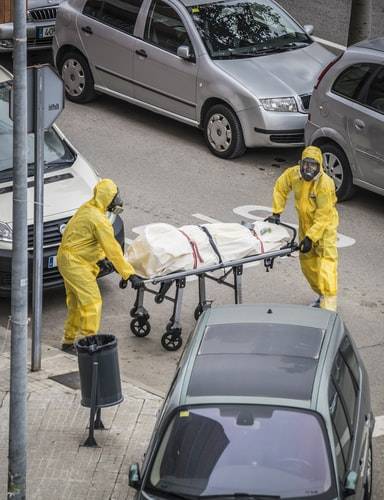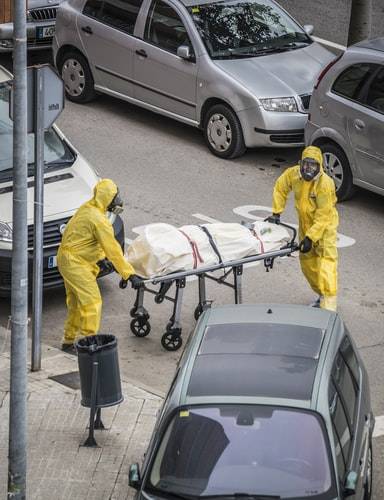The United States is experiencing confusion and intense debate over a recommendation that allows those vaccinated against COVID-19 to not wear masks, while the World Health Organization warned that the pandemic is on track to cause more deaths than those recorded in 2020. While several countries are showing hope for a return to a more normal life, others, like India, remain trapped in a cycle of the pandemic's devastating spread. The COVID-19 pandemic has claimed 3.3 million lives since the end of December 2019, and the emergence of new variants of the virus and discrepancies in vaccination campaigns continue to raise concerns.
In the United States, after authorities lifted the recommendation for mask-wearing by fully vaccinated individuals, who make up about 35% of the population, several retailers such as Walmart and Costco announced on Friday that they would no longer enforce mask mandates in their stores, although it remains mandatory where local laws require it. However, the new non-binding guidelines issued by health authorities surprised local officials, experts, and companies and led to debate and even clashes within Congress.
Evan Mata (47 years old), who works for a tourism company in New York, expressed his astonishment by saying, "Before that, masks were important and suddenly they are not." He added, "What worries me is how it can be verified that people have been fully vaccinated? I believe there are many who will not wear masks anymore even if they are not vaccinated."
Speaking in Geneva, WHO Director-General Tedros Adhanom Ghebreyesus stated that "at the pace things are moving now," the pandemic will cause "more deaths in its second year than in the first." He called for abandoning the vaccination of children and adolescents against COVID-19 and for donating doses released in this manner to the COVAX system for redistribution to poor countries.
Amid this context, tennis star Roger Federer said athletes "need a decisive decision" regarding the continuation of the Tokyo Olympics. He added that he would fully understand if the event, which was postponed for a year, were to be canceled. He told Swiss television channel LeMan Bleu, "We don’t hear much information, and that makes me think the Games will be organized, even though I’ve heard that many people in Tokyo oppose it."
In fact, Japan extended the state of emergency imposed in six regions, including the capital, and added three more areas due to the emergence of COVID-19 cases just ten weeks before the opening of the Olympics.
At the same time, based on results that governments deem encouraging, several countries, especially in Europe, are reopening their struggling economies. Greece lifted all travel restrictions that had been in place for seven months on Friday to kick off a long-awaited tourism season. The only condition for traveling to the country is to be vaccinated or to present a negative test result. German tourist Caroline Falk (28 years old) said on Crete, "Restaurants are open, you can go to the beach, enjoy the good weather, and do some shopping." She added that "being able to go out again is wonderful."
In Poland, cafes and restaurants can start welcoming customers on terraces starting Saturday. Italy announced the lifting of a five-day limited quarantine for European tourists on Sunday, while Portugal expects hundreds of British holidaymakers to benefit from the lifting of travel restrictions granted to Lisbon for its first tourism market starting Monday.
England is also preparing to make a significant step forward by reopening museums, hotels, and sports venues on Monday, thanks to a sharp decline in COVID-19 cases following a long lockdown and rapid vaccination campaigns. Nevertheless, British Prime Minister Boris Johnson warned on Friday that the Indian variant could hinder the continuation of reopening if it continues to spread, following a worrying rise in infections in some areas, especially in the northwest and London.
France announced that travelers from four new countries (Colombia, Bahrain, Costa Rica, and Uruguay) will undergo a ten-day quarantine starting Sunday, joining a previously existing list of twelve countries.
In India, amid the peak of a devastating outbreak, many states are struggling with vaccine shortages, with the available doses allocated to 600 million adults aged between 18 and 44 years. However, vaccination with the Russian "Sputnik V" began on Friday in this country with a population of 1.3 billion people. The campaign started in Hyderabad (central India) after emergency approval for the use of this vaccine by New Delhi on April 12.
After flooding major Indian capitals into chaos alongside shortages of medications and oxygen supplies as well as hospital beds, the virus continues to spread in rural areas lacking infrastructure, where bodies are buried or sometimes thrown into rivers, while patients attempt to treat themselves with herbs. In recent days, more than a hundred corpses have been washed up on the banks of the Ganges River, raising fears of a catastrophic situation in other areas as well.
Kidwai Ahmed told AFP in his village of Sadallapur in Uttar Pradesh (north) that "they are leaving people to die." He added, "This is the India we hide from everyone."




